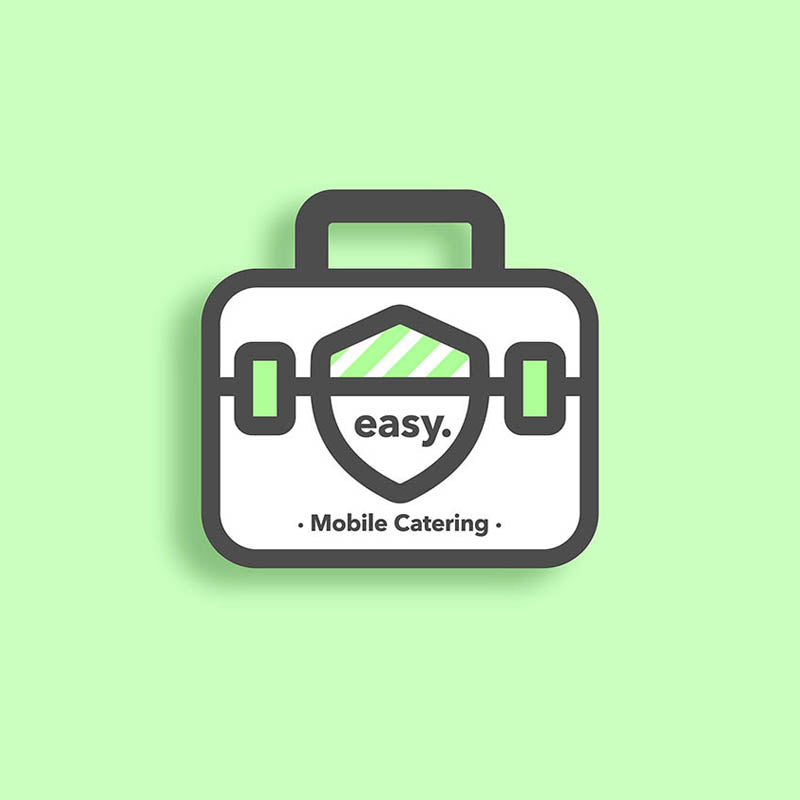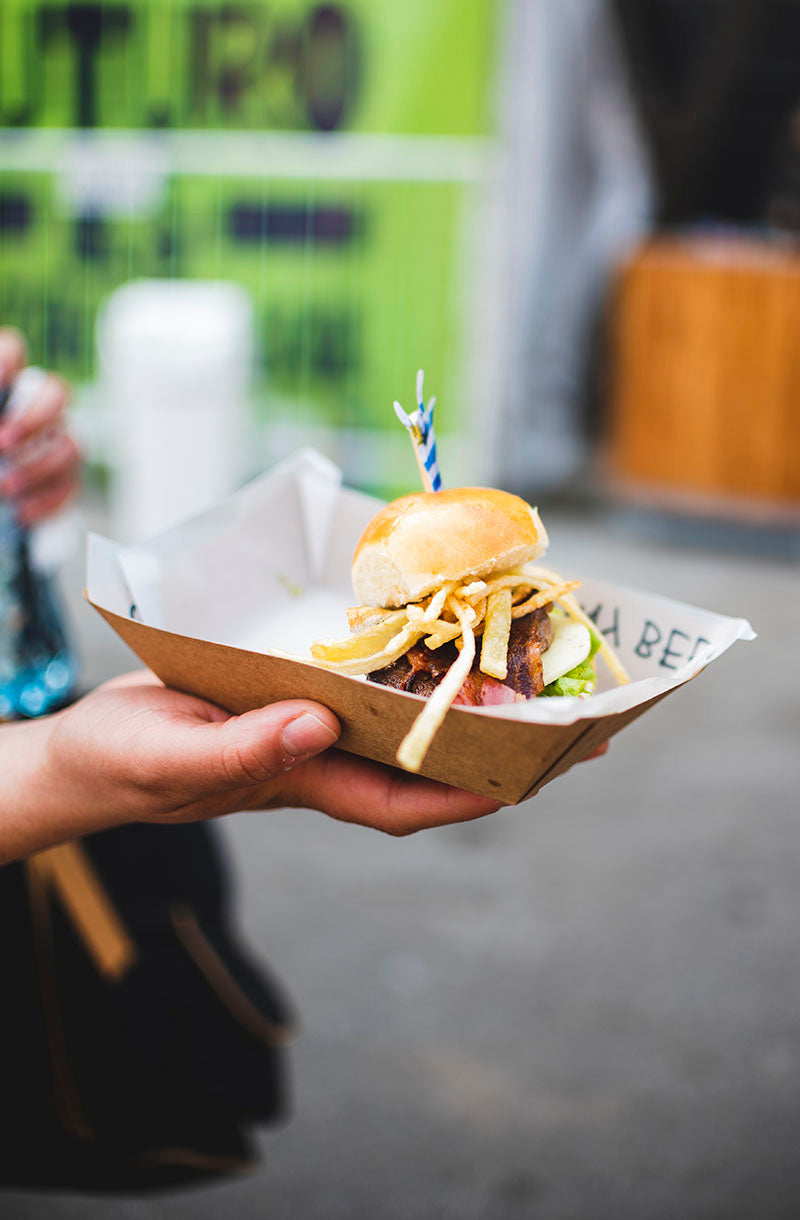
Mobile Catering Health and Safety Templates & Guidance
Pre-filled, editable health and safety templates for mobile catering businesses, mobile restaurants, food trucks, street food stalls, and mobile food vans — including risk assessments, policies, and more to keep your business safe, professional, and compliant.

Take charge of health and safety in your Mobile Catering Business with our easy-to-use templates
Simplify health and safety management in your mobile catering business, mobile restaurant, food truck, street food stall, or mobile food van with our editable templates, designed specifically for the catering industry. These practical documents help mobile caterers stay compliant with regulations and protect staff, customers, and contractors from everyday risks in a busy catering environment.
Many templates come pre-filled with detailed, industry-relevant content — from mobile catering risk assessments and health and safety policies to fire safety templates, COSHH documents, accident reports and safety guidance — making completion quick, accurate, and stress-free. With our ready-to-use tools, you can focus on serving great food and growing your mobile catering business while maintaining the highest standards of safety and compliance.

Food for Thought: Why Health and Safety Matters for Mobile Catering Businesses
The appeal of mobile catering lies in the excitement of street food, the flexibility of food trucks, and the convenience of mobile food vans. But behind the serving hatch sits something just as important: a solid approach to health and safety. From protecting your staff to meeting compliance requirements, a mobile catering business’s dedication to safety is what keeps the operation running smoothly.
Staff and Customer Safety
Mobile catering restaurants are compact, high-pressure environments filled with hot oil, boiling water, gas cylinders, sharp utensils, and electrical equipment. The wellbeing of staff is essential not only to prevent accidents but also to build confidence and maintain productivity. At the same time, customer safety must remain a top priority — from keeping serving areas clean and allergen information visible, to reducing risks of slips, trips, and burns. A strong safety culture ensures both staff and customers are protected while creating a positive food experience.
Meeting Legal Duties with Confidence
Health and safety laws are not optional; they are essential obligations. Non-compliance can lead to fines, enforcement action, or even business closure. For food trucks, catering trailers, and street food stalls, tools such as risk assessments, fire safety templates, and health and safety policies are crucial for demonstrating compliance and managing risks effectively. Keeping documentation accurate and up to date not only meets legal requirements but also provides peace of mind for business owners and managers.
Protecting Your Reputation
In today’s digital age, one negative incident can harm a business overnight. News of poor hygiene, unsafe practices, or customer accidents can spread quickly through social media and online reviews. A strong commitment to health and safety protects your reputation, builds trust with customers, and encourages repeat visits, private bookings, and long-term business growth.
Proactive Safety Tools
Effective safety management is about prevention, not just reaction. Regular staff training, clear signage, and up-to-date risk assessments form the foundations of safe daily operations. Routine inspections and a culture of accountability ensure hazards are identified and resolved before they escalate. To make this easier, we’ve developed ready-to-use compliance documents designed specifically for mobile catering businesses, mobile restaurants, food trucks, and street food stalls. These tools allow you to maintain the highest standards of safety while focusing on what you do best — serving delicious food and delighting your customers.
Top 3 Health and Safety Hazards for Mobile Caterers:
-

Food Hygiene and Contamination
View ProductsServing unsafe or contaminated food from a mobile catering unit, food truck, or street food stall can result in food poisoning and serious illness for customers. To prevent this, businesses must maintain strict temperature control, separate raw and cooked food, implement thorough cleaning routines, and train staff in allergen awareness and food safety best practice.
-

Fire Safety in Mobile Units
View ProductsCooking appliances, LPG cylinders, and electrical equipment are all essential for mobile catering businesses, but they also create potential fire hazards if not managed properly. A small incident in a compact food truck or catering van can escalate quickly, putting staff, customers, and the business at risk. Fire safety can be strengthened through regular maintenance of appliances, safe storage of gas, providing fire blankets and extinguishers, training staff in emergency procedures, and carrying out routine fire risk assessments.
-

Burns and Scalds
View ProductsOperating mobile food vans and catering trailers often involves handling boiling water, hot oil, steam, and hot equipment. Staff can suffer painful burns or scalds if safe working practices are not followed. Controls include using protective gloves, positioning heating equipment securely, providing staff training, and ensuring lids and guards are in place to reduce splashing or contact with hot surfaces, liquids and steam.

Why pay expensive consultant fees when you can manage health and safety yourself?
Ensure compliance while saving time and money by creating health and safety documents, customised to your business, yourself. Our health and safety range for mobile catering businesses covers a suite of essential templates including health and safety policies, risk assessments, COSHH forms, fire safety documents, health and safety guidance, safety posters and more.
Benefits of managing health and safety yourself...
-

Improve safety
Health and safety at work is about preventing accidents, incidents and ill-health by assessing the work environment, the activities within it, and taking appropriate action.
-

Ensure compliance
Our ready to use templates, many of which are pre-filled, will enable you to quickly increase your compliance to health and safety laws and regulations.
-

Save money
With health and safety consultants often charging upwards of £400 per day, there is a better way. Take control and save yourself time and money.

Serving Up Safety: Overcoming Mobile Catering Compliance Challenges
Running a mobile catering business — whether it’s a food truck, street food stall, catering van, or mobile kitchen — means juggling countless responsibilities at once. From preparing food and serving customers to managing stock and keeping equipment in good working order, the daily pressures can easily push health and safety compliance further down the list than it should be.
For many small to medium-sized mobile catering businesses, finding the time and resources to fully implement and maintain safety measures can feel overwhelming. The need to keep revenue flowing and customers satisfied often takes priority, but neglecting compliance can create risks with serious long-term consequences.
At easyhealthandsafety, we take the pressure off mobile caterers by providing ready-to-use templates and guidance that are practical, affordable, and simple to follow. Our pre-filled risk assessments, policies, and compliance tools help you protect staff, customers, and your business reputation — so you can focus on serving great food and growing your mobile catering business with confidence.
Frequently Asked Questions
Mobile Catering Health and Safety FAQs
How can I create a risk assessment for my mobile catering business?
The easiest way to create a compliant risk assessment for your mobile catering business is to start with a pre-filled risk assessment template designed for the mobile catering industry.
To create a risk assessment from scratch for your mobile catering business, start by walking through your setup — from preparation and cooking areas to serving points and storage. Identify anything that could cause harm, such as gas leaks, burns, slips, electrical faults, or food contamination. Next, consider who could be affected (staff, customers, delivery drivers, or contractors) and how. Record the control measures you’ll use to reduce each risk, such as training staff, maintaining equipment, or ensuring good ventilation. Finally, review your assessment regularly and update it whenever there are significant changes to your processes, equipment, or locations.
Our Mobile Catering Risk Assessment Template makes this process simple. It’s pre-filled with industry-specific hazards and control measures, designed for food trucks, street food stalls, and catering vans. It’s fully editable, so you can easily adapt it to your setup, saving hours of work and ensuring professional results.
For mobile catering businesses that want a complete compliance solution, our Mobile Catering Health and Safety Template Bundle includes the full risk assessment along with policies, fire safety, COSHH assessments, accident forms, staff safety guidance, and more — helping you stay compliant, organised, and confident that legal requirements are covered.
Do mobile caterers need to complete a risk assessment?
Yes — all mobile catering businesses must complete a suitable and sufficient risk assessment.
Under the Health and Safety at Work etc. Act 1974 and the Management of Health and Safety at Work Regulations 1999, employers are legally required to assess and manage risks to employees, customers, and contractors. For mobile caterers, this means identifying hazards such as fire, burns, slips, gas safety, and food hygiene issues, then recording how these risks will be controlled. Completing a thorough risk assessment not only helps you stay compliant but also protects your business against potential legal action if an accident or injury occurs.
Even if you’re a small, owner-operated food truck or street food stall, completing a written risk assessment is a strongly recommended best practice measure. It demonstrates compliance to event organisers, inspectors, and local authorities — and provides valuable evidence that you’re managing health and safety responsibly.
Our editable Mobile Catering Risk Assessment Template comes pre-filled with mobile-catering-specific hazards and controls, making it quick and easy to adapt for your business. It’s fully editable and designed to save time while ensuring your assessment meets legal standards and reflects real-world catering operations.
For a complete compliance solution, our Mobile Catering Health and Safety Template Bundle includes the full risk assessment along with over 60 essential documents — covering policies, COSHH forms, fire safety templates, staff safety guidance, and more — helping your business stay safe, professional, and fully compliant.
What needs to be included in a mobile catering risk assessment?
Your risk assessment must cover all significant hazards related to the operations of your mobile catering business.
A thorough risk assessment for your mobile food business should include hazards like fire, gas leaks, food hygiene, manual handling, slips and trips, burns, electrical safety, and waste management. It should identify who might be harmed (staff, customers, contractors, delivery drivers), explain how they could be harmed, and outline clear, practical controls.
Our ready-made Mobile Catering Risk Assessment Template includes all of this content in a structured, professional format.
What health and safety documents do I need for my mobile catering business?
Every mobile catering business must have essential safety documents in place.
At a minimum, you’ll need a Health and Safety Policy, Mobile Catering Risk Assessment, Fire Risk Assessment, COSHH Risk Assessments, and an Accident Report Form to meet legal duties under UK health and safety regulations. A Health and Safety Policy is a legal requirement for businesses with five or more employees, but it’s strongly recommended for smaller catering businesses as well as it shows professionalism and provides a clear structure for managing safety.
Our Mobile Catering Health and Safety Template Bundle includes all of these, pre-filled and ready to adapt for your food truck, street food stall, or catering van.
Do I need a fire risk assessment for a food truck or catering van?
Yes, a fire risk assessment is a legal requirement for all mobile food businesses.
Because mobile catering units often use cooking equipment, gas cylinders, and electrical appliances, the risk of fire can be high. A fire risk assessment helps you identify ignition sources, plan evacuation routes, and put controls in place such as fire extinguishers and training.
Our Fire Risk Assessment Template is designed to provide a step-by-step approach to meeting your legal obligations.
How do I manage gas safety in my mobile catering trailer or food van?
Gas safety is one of the biggest concerns in mobile catering.
You must ensure that all LPG cylinders, regulators, and pipework are properly installed, maintained, and regularly inspected by a Gas Safe engineer. Staff should also be trained to recognise gas leaks and shut off supplies in an emergency. Including gas hazards in your Mobile Catering Risk Assessment is essential.
Our Mobile Catering Health and Safety Template Bundle covers gas safety with practical checklists, safety guidance and more.
Do I need COSHH risk assessments for cleaning chemicals in my mobile catering restaurant?
Yes, COSHH assessments are required for any hazardous substances used within the business.
Most mobile caterers use cleaning products such as degreasers, sanitisers, and detergents, which can cause skin irritation, burns, or respiratory issues if not handled correctly. A COSHH Risk Assessment outlines how to store, use, and dispose of these chemicals safely.
Our COSHH Risk Assessment Templates are tailored for small businesses, with pre-filled content for many hazardous substances used in mobile catering, making compliance simple and effective. For hazardous substances we have not yer covered there is also a Blank COSHH Risk Assessment Template available.
How should I record accidents or near-misses in my mobile food truck?
All mobile catering businesses must keep a record of accidents and incidents, ideally on a suitable and sufficient accident report form.
Accident reporting is a legal requirement under RIDDOR, and keeping accurate records also helps you identify patterns and prevent future incidents. For mobile catering businesses, an Accident Report Form is a vital tool for recording injuries, burns, slips, or equipment-related accidents.
Our downloadable Accident Report Form Template ensures you capture the right information every time.
How should I manage allergen risks in my mobile catering business?
Clear allergen management is critical to customer safety.
Under food labelling regulations, you must provide accurate allergen information for all food items sold. Cross-contamination must also be controlled through good hygiene, separation of ingredients, and clear labelling. Including allergen control in your risk assessment demonstrates compliance and builds trust with customers.
Our Mobile Catering Risk Assessment contains pre-filled allergen sections ready to adapt to your menu and specific business operations.
What training do my staff need for mobile catering?
Staff must be trained to work safely in a catering environment.
Mobile catering staff should receive training in food hygiene, allergen awareness, manual handling, fire safety, and safe use of gas and electrical equipment. Training should be refreshed regularly and documented as part of your compliance system.
Our Mobile Catering Health and Safety Template Bundle includes a health and safety induction for new starters, and staff safety guidance on various topics to help you manage this efficiently.
Do I need a health and safety policy for a small mobile catering business?
Yes, all mobile food businesses should have a health and safety policy. Businesses with five or more employees are legally required to have this policy in writing, although it is a best-practice measure for all mobile caterers to have one in place regardless of size.
Even if you employ fewer than five staff, having a Health and Safety Policy is still strongly recommended. It provides a clear framework for managing risks, helps prevent accidents, and shows regulators, event organisers, and customers that you take safety seriously. Without one, small catering businesses can easily fall foul of health and safety regulations or miss important steps that protect staff and customers.
Our Health and Safety Policy Template is fully editable, is supplied with pre-filled content and examples, and can be tailored to your mobile catering business quickly and easily.
What are the main hazards in a mobile catering restaurant?
Mobile food catering businesses face a unique mix of risks.
Common hazards include fire from cooking equipment, slips and trips in compact spaces, burns from hot oil or liquids, gas leaks from LPG systems, electrical faults, food contamination, and manual handling injuries. Completing a risk assessment is the most effective way to identify and control these hazards.
Our ready-to-use, editable Mobile Catering Risk Assessment Template comes pre-filled with catering-specific content, making compliance fast and straightforward.
For mobile catering businesses that want a complete compliance solution, our Mobile Catering Health and Safety Template Bundle includes the full risk assessment along with policies, fire safety, COSHH assessments, accident forms, staff safety guidance, and more — helping you stay compliant, organised, and confident that legal requirements are covered.
Why is health and safety compliance important for mobile catering businesses?
Compliance is not just about ticking boxes — it protects your business.
Failing to manage health and safety properly can result in enforcement action, fines, business closure, or damage to your reputation. For mobile catering businesses, where space is tight and risks are high, strong compliance also builds customer confidence and trust.
Using our Mobile Catering Health and Safety Template Bundle gives you a suite of essential health and safety documents — from risk assessments to accident report forms — so you can stay compliant and focus on growing your business.







